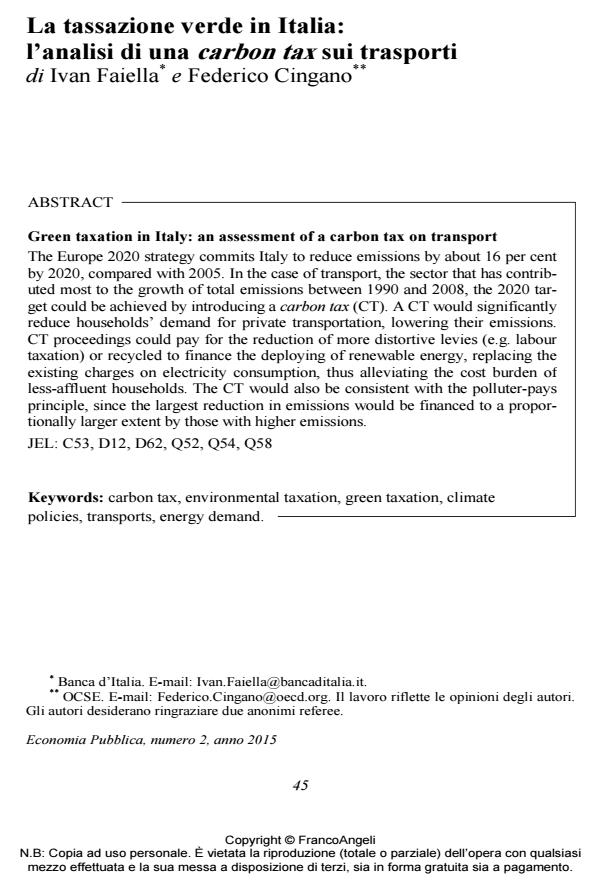La tassazione verde in Italia: l’analisi di una carbon tax sui trasporti
Titolo Rivista ECONOMIA PUBBLICA
Autori/Curatori Ivan Faiella, Federico Cingano
Anno di pubblicazione 2016 Fascicolo 2015/2
Lingua Italiano Numero pagine 46 P. 45-90 Dimensione file 605 KB
DOI 10.3280/EP2015-002002
Il DOI è il codice a barre della proprietà intellettuale: per saperne di più
clicca qui
Qui sotto puoi vedere in anteprima la prima pagina di questo articolo.
Se questo articolo ti interessa, lo puoi acquistare (e scaricare in formato pdf) seguendo le facili indicazioni per acquistare il download credit. Acquista Download Credits per scaricare questo Articolo in formato PDF

FrancoAngeli è membro della Publishers International Linking Association, Inc (PILA)associazione indipendente e non profit per facilitare (attraverso i servizi tecnologici implementati da CrossRef.org) l’accesso degli studiosi ai contenuti digitali nelle pubblicazioni professionali e scientifiche
The Europe 2020 strategy commits Italy to reduce emissions by about 16 per cent by 2020, compared with 2005. In the case of transport, the sector that has contributed most to the growth of total emissions between 1990 and 2008, the 2020 target could be achieved by introducing a carbon tax (CT). A CT would significantly reduce households’ demand for private transportation, lowering their emissions. CT proceedings could pay for the reduction of more distortive levies (e.g. labour taxation) or recycled to finance the deploying of renewable energy, replacing the existing charges on electricity consumption, thus alleviating the cost burden of less-affluent households. The CT would also be consistent with the polluter-pays principle, since the largest reduction in emissions would be financed to a proportionally larger extent by those with higher emissions. Keywords: carbon tax, environmental taxation, green taxation, climate policies, transports, energy demand
Parole chiave:Carbon tax, environmental taxation, green taxation, climate policies, transports, energy demand
Jel codes:C53, D12, D62, Q52, Q54, Q58
- A Micro-founded Climate Stress Test on the Financial Vulnerability of Italian Households and Firms Ivan Faiella, Luciano Lavecchia, Alessandro Mistretta, Valentina Michelangeli, in SSRN Electronic Journal /2021
DOI: 10.2139/ssrn.3960005 - A climate stress test on the financial vulnerability of Italian households and firms Ivan Faiella, Luciano Lavecchia, Valentina Michelangeli, Alessandro Mistretta, in Journal of Policy Modeling /2022 pp.396
DOI: 10.1016/j.jpolmod.2021.11.001 - Vulnerable Households in the Energy Transition Ivan Faiella, Luciano Lavecchia, pp.173 (ISBN:978-3-031-35683-4)
- Una Nuova Misura Della Povertt Energetica Delle Famiglie (A New Measure of Households' Energy Poverty) Ivan Faiella, Luciano Lavecchia, Marco Borgarello, in SSRN Electronic Journal /2017
DOI: 10.2139/ssrn.3073102 - Carbon Tax acceptability: A comparative experimental analysis Lucia Rotaris, Alessandro Gardelli, in ECONOMICS AND POLICY OF ENERGY AND THE ENVIRONMENT 1/2019 pp.117
DOI: 10.3280/EFE2018-001005 - The carbon content of Italian loans Ivan Faiella, Luciano Lavecchia, in Journal of Sustainable Finance & Investment /2022 pp.939
DOI: 10.1080/20430795.2020.1814076 - To Eat or to Heat: Are Energy Bills Squeezing People's Spending? Andrea Colabella, Valentina Michelangeli, Luciano Lavecchia, Raffaella Pico, in SSRN Electronic Journal /2024
DOI: 10.2139/ssrn.4849271
Ivan Faiella, Federico Cingano, La tassazione verde in Italia: l’analisi di una carbon tax sui trasporti in "ECONOMIA PUBBLICA " 2/2015, pp 45-90, DOI: 10.3280/EP2015-002002